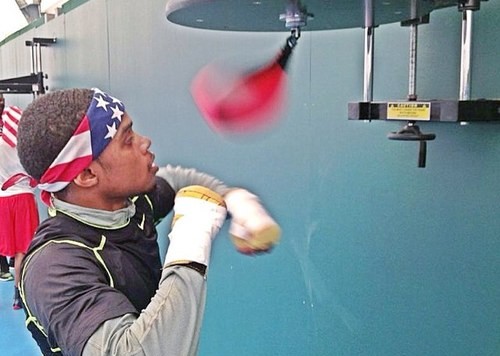[UPDATE: Much of what I wrote below can now be ignored, because Errol Spence won his appeal. The International Amateur Boxing Association (AIBA) has overturned the decision, which is the right call, saying that the referee should’ve issued warnings to Krishan Vikas that would have cost Vikas four points, which is a pretty strange basis for the reversal. However it got it, Team USA now — through Spence — has the “sporting chance” I mentioned at the end that it deserved.]
When the United States’ Errol Spence, Jr. lost his fight Friday to India’s Krishan Vikas, it cemented the worst-ever Olympic showing for a steadily eroding boxing powerhouse that once produced many of the great behemoths of the Games and the sport as a whole, from Muhammad Ali to Sugar Ray Leonard to Oscar De La Hoya.
Once draped regularly in gold and other precious metals, the necks of U.S. boxers will depart London naked for the first time in the Olympics, worse by one bronze than the previous lowlight in U.S. boxing history, the 2008 Games. It would have been stunning, had you said it even a decade ago: Every male member of Team USA has now been eliminated by the round of 16.
A long search for blame will surely begin. Say what you will about the disrepair of the U.S. amateur system, and almost all of it will be true. But when the U.S.’s ignominious showing is etched in the history books, it better include an asterisk.
Spence (pictured above) was flat-out robbed, in a decision so repugnant that Twitter erupted in worldwide outrage. He battered his opponent after the 1st round, forcing Vikas to spit out his mouthpiece in the 2nd to buy time and hold Spence throughout the 3rd to try to preserve his lead.
Offered former Welsh boxing great Joe Calzaghe, with telling capitalization: “Can’t believe all the Americans are out! Thought Spence was Robbed though!” Spence was indeed robbed, with a capital “R.” Tweeted current British light heavyweight Tony Bellew: “I hope they overturn that decision for the poor kid! To have you dreams ripped away like that is just wrong! Now people! That was A ROBBERY!” Adam Booth, trainer of David Haye, tweeted of Spence that he “was just publicly violated by AIBA. R.i.P Olympic boxing is dead.”
And so it went, from Canada to Mexico to, of course, the United States, where the loss was particularly painful. The consensus was that it was the worst decision of the Olympics so far, in a 2012 installment that has had more than its share of outrages. Vikas’ body language after the fight suggested he didn’t think he won. The referee raised Spence’s hand as the result was announced, only to then raise Vikas’. USA Boxing appealed the result; wouldn’t you know it, suspended German referee Frank Scharmach found himself among the judges for this bout somehow.
Nor was Spence alone on Team USA in suffering a loss he didn’t deserve. Almost everyone agrees that middleweight Terrel Gausha should still be fighting after his unjustifiable decision loss to Vijender Singh.
The horrendous Olympic scoring and officiating is victimizing one nation after the other in 2012, and has been well-documented. It is telling that the relatively unsympathetic United States, given its long history of general Olympic and specific Olympic boxing success, could be turned into a worldwide cause celebre.
Granted, some — maybe even most — of U.S. boxing’s wounds are self-admistered. Would-be super heavyweight gold medalists instead populate the National Football League or National Basketball Association. Would-be medalists in the lower weight classes now often skip the Olympics altogether, lured by the more immediate, more figurative gold and silver of a pro career. The U.S. amateur system is a shambles; The New York Times and Washington Post both recently offered compelling documentation of that. What happened to Spence and Gausha shouldn’t excuse the United States from taking a hard look at how it can wash away the rot that had long been building beneath the epidermis.
Maybe, had they moved on, Spence and Gausha would have lost their next fights and Team USA would have ended up medal-less anyhow. But the Olympic ethos is supposed to epitomize, among other things, fair play. And Spence and Gausha weren’t given a sporting chance to determine whether their country made the wrong kind of history.

